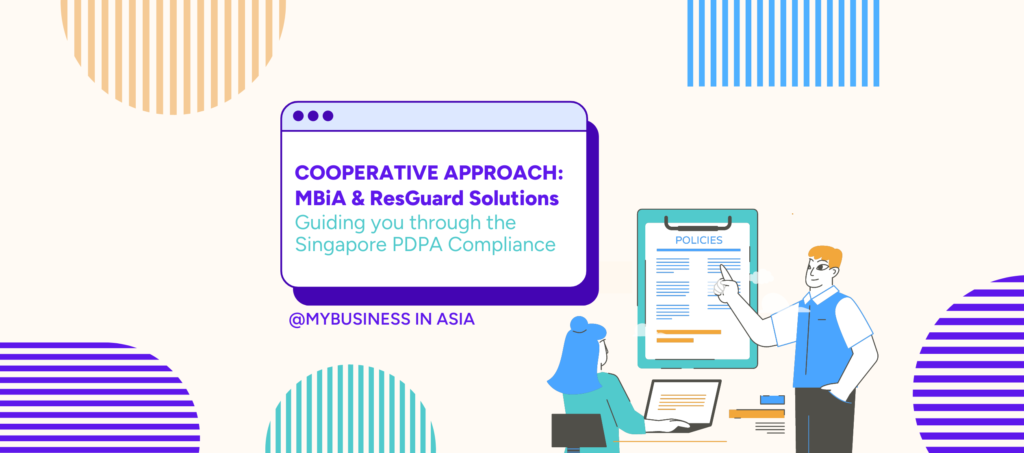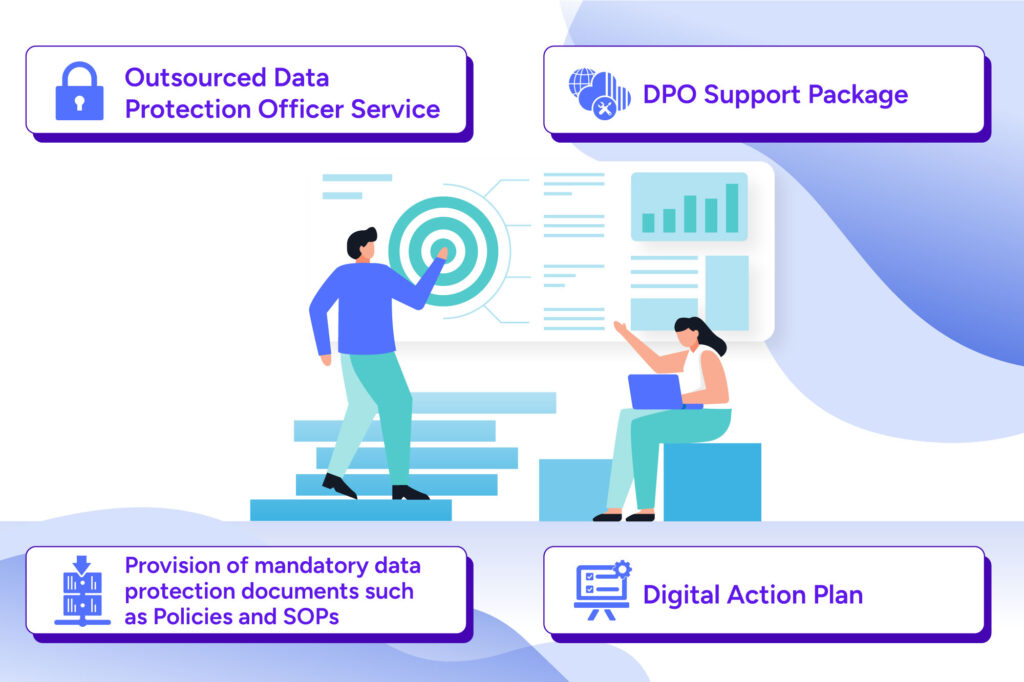
In a rapidly evolving digital landscape, the challenges of safeguarding personal data are ever-present and demand a robust response.
In acknowledgment of these mounting pressures, we have forged a strategic partnership with ResGuard Solutions, an esteemed industry leader renowned for its expertise in data protection and cybersecurity. Together, we aim to alleviate the burdensome complexities of achieving PDPA compliance, offering SMEs a comprehensive solution to navigate this regulatory landscape with confidence and ease.
In this article, we will cover:
- What is the Personal Data Protection Act (PDPA) in Singapore?
- The Collaborative Offering of MBiA & ResGuard Solutions
- Conclusion
What is the Personal Data Protection Act (PDPA) in Singapore?
The Personal Data Protection Act (PDPA) of Singapore serves as a regulatory framework governing the management of personal data, encompassing its collection, utilization, and disclosure. Under the PDPA, personal data refers to information, irrespective of its accuracy, that can identify an individual. This legislation not only grants individuals certain rights concerning their personal information but also imposes obligations on organizations to ensure the safeguarding of collected data.
Who is covered under the PDPA?
The PDPA has broad coverage and generally applies to all private organizations and the personal information they collect. However, there are a few exceptions:
- Any individual acting in a personal or domestic capacity
- Any employee working in the course of their employment with an organization
- Any public agency
What are the requirements & obligations
1. Mandatory according to PDPA
- Every registered company in Singapore must appoint a DPO
- Data Protection Policies and SOPs must be in place
- Documentation of the Data Inventory and compliance with the obligations must be ensured
- Individuals must be able to exercise their User Rights
- The awareness of the employees must be raised
- Data Breach Response Plan must be in place
2. Possible fines and reactions in case of non-compliance
- Financial penalties of up to 1 million Singapore dollars or 10% of annual turnover (whatever higher).
- Directions and Warnings from authorities in case of noncompliance.
- Damage to reputation through publication of the offense and the penalty.
- Audit of the entire business due to a complaint to the authority
The collaborative offering of MBiA & ResGuard Solutions
ResGuard Solutions, headquartered in Singapore, specializes in software and consulting services focused on data protection, cybersecurity, and compliance. Leveraging a digital As-a-Service Management Platform, we assist small and medium-sized enterprises (SMEs) in meeting compliance standards and enhancing internal processes.
In alignment with our shared objective of assisting SMEs in adhering to regulations and improving privacy practices, MBiA collaborates with ResGuard Solutions to deliver a comprehensive range of services. Our tailored offerings address the challenges posed by increasingly stringent regulations and growing privacy concerns, providing expertise and solutions for seamless navigation of PDPA compliance complexities.
By choosing MBiA as your partner, you’re not just securing maximum operating efficiency – you’re also ensuring strict compliance with data protection regulations. This entails entrusting all internal complexities to us, allowing you to concentrate solely on propelling your business forward and fostering growth.
Here’s what we’ve got you covered:

Outsourced Data Protection Officer (DPO) service
We appoint a certified data protection expert as your DPO
- Implementation of Data Protection Framework (including Policies & SOPs, Data Inventory, Data Breach Response Plan, Employee Awareness)
- The DPO performs ongoing duties throughout the year such as handling of User Rights and requests from authorities.
- Access to the digital Data Protection Manager to monitor the progress and keep track of the next steps.
DPO support package
For clients who opt to appoint an internal DPO, we offer comprehensive support in setting up their data protection framework to align with PDPA compliance standards. Through engaging online workshops and personalized guidance, we ensure that clients’ internal DPOs are equipped with the requisite knowledge and tools to effectively discharge their duties. Moreover, clients gain access to our cloud-based data protection portal, facilitating seamless collaboration and resource management.
Provision of mandatory data protection documents such as Policies and SOPs
We provide essential documentation essential for PDPA compliance, including:
- Data Protection Policy (internal)
- Data Protection Notice (to be published on the website)
- Data Subject Request Procedure
- Personal Data Breach Procedure
- PDPA Employment Consent
Digital action plan
Conducting a thorough gap analysis is a crucial first step in the journey towards PDPA compliance. Our ‘Digital action plan’ takes this assessment a step further by providing SMEs with a detailed roadmap for achieving compliance objectives. Based on the results of the gap analysis, our experts generate a tailored action plan that outlines specific tasks, timelines, and responsible parties.
From conducting staff training sessions to implementing technical controls and reviewing existing policies, each action item is carefully prioritized and sequenced to ensure maximum efficiency and effectiveness. By following this structured approach, SMEs can systematically address compliance gaps and mitigate risks while working towards their ultimate goal of achieving PDPA compliance.
Conclusion
Achieving PDPA compliance isn’t a one-time task but an ongoing journey that requires continual vigilance, dedication, and a proactive approach from businesses. In a rapidly evolving digital landscape, the challenges of safeguarding personal data are ever-present and demand a robust response. By embracing the guidance and support provided by MBiA and ResGuard Solutions, businesses can navigate these challenges effectively.
Through adherence to the PDPA and leveraging the expertise offered by our partnership, organizations can mitigate the risks associated with non-compliance, safeguard their brand reputation, and cultivate trust among customers, partners, and the wider community.